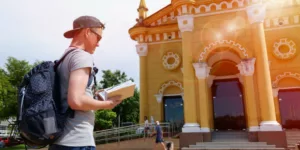When Thomas Cook (1808–1892) founded the Thomas Cook & Son travel agency, he established himself as one of the world’s first travel agents. Initially a one-man show (the “Son” came later), Cook arranged for 150,000 tourists to attend Prince Albert’s Great Exhibition in London in 1851. This first world’s fair was as notable for its collection of literary figures as it was for its other exhibits. Among the former were Alfred Tennyson, Charles Dickens, Charlotte Brontë, George Eliot, Lewis Carroll, and William Makepeace Thackeray. Cook used his skills as a trained printer to market his tour packages with enticing travel booklets that offered Industrial Age factory workers a means of escape.
Some 170 years later, times have changed. International travel and tourism is a booming industry that reaped a whopping $7.6 trillion US in 2016. The direct, combined impact of accommodations, transportation, attractions and entertainment on the economy amounted to $2.3 trillion US the same year. This steady annual growth has started to spread to lesser-known countries like Namibia in Africa and the Balkan state of Montenegro in southeast Europe. The monumental growth of the travel industry has been fueled by two primary factors: perspective and technology.
Modern Perspectives on the Purpose of Travel
Modern (read “Millennial”) travelers view travel differently from the 19th-century tourists who attended England’s Great Exhibition. While the Exhibition can be viewed as an elaborate display of imperialism, its stated motive was “for the purpose of exhibition of competition and encouragement.” Nevertheless, art and raw colonial materials took pride of place in the specially constructed Chrystal Palace, while technology, machinery, and scientific instruments – such as air pumps, barometers, electric telegraphs, and microscopes – had a somewhat subservient role. Even so, the Industrial Revolution that began in Britain in the mid-1700s was the precursor to the idea of progress via technology.
Today, Millennials are the largest generation of travelers, as well as the largest financial contributors to the tourism industry. The reason for their enthusiasm is almost the opposite to that of their 19th-century counterparts or even of the older generations now living. Rather than seeking to impose the “triumphs” of capitalism and other consumerist mentalities onto other cultures, they seek to conform to the local culture as organically as possible. The idea is to embrace the world as it is and to overcome cultural obstacles by focusing on the similarities that bring human beings together – an idea that’s both helped and hindered by the role of technology.
Technology as a Means to Connect and Disconnect
Gone are the days of quaint, hand-printed pamphlets or even of ultra-schmoozy ads that promise the impossible. Millennials ain’t fallin’ for it. This generation of consumers is as hardnosed as they are starry eyed. They can spot a “solid gold” sales trap without looking at the $1 price tag, thank you very much, and they deeply resent any attempts to swindle them (who doesn’t?) as an insult to their intelligence.
Unlike the machinery of the Industrial Revolution, the technology of today is just as much about interconnectivity as it is about productivity. American consumers want fast, easy service, as well as the ability to share information and connect with the people who matter to them. When it comes to traveling, digital reservations; online check-in and banking tools; automated confirmations; online and offline streaming for movies and music, etc.; a reliable internet connection; and a growing number of mobile apps make it nearly impossible to ignore your family, friends, and coworkers, even if you wanted to. The “white noise” of modern life can lull us into a false sense of fulfillment – a trap that authenticity-loving Millennials are literally going the extra mile to avoid.
Travel as a Form Discovery and Recovery
Like Cook’s 19th-century factory workers, Millennials see travel as a means of escape, as well as of discovery. They seek to lose themselves in an adventure to gain something of lasting value that enriches their lives. Like people of the industrial age, Millennials view technology as a vehicle of progress, a way to make the world a better place – or at least a more efficient one. They love the way that technology can bring people closer together, but at the end of the day, they grasp the importance of disconnecting from the “white noise” of technology to embrace the immediacy of their environment.
This is especially true if their environment is a far-flung, “exotic,” and/or vanishing travel destination (like Venice or Timbuktu). Millennials like the novelty of adventure without the life-threatening dangers (think a pre-glacier Titanic, not the African Queen). They also expect clean accommodations; a friendly, helpful, knowledgeable staff; and a reasonable amount of modern amenities – even if they choose to throw their iPhone in the toilet instead of using the free Wi-Fi to return their ex’s texts. This is particularly true of “bleisure” (i.e., business + leisure) getaways and the growing number of affluent Millennials who can afford luxury vacations. Good money demands good service.
The Continued Importance of Travel Agents and Marketing Groups
For an increasing number of Millennials, this means investing in a travel agent or someone who’ll work with them closely to anticipate their travel needs throughout the process. These are people who’ve traveled extensively in their areas of expertise and made friends with the local hostellers, hoteliers, managers, and even chefs. Often, technology has enabled them to work from anywhere in the world. This also includes travel firms, like Fidelis Marketing Group, which provide the contextual and visual elements that bring your next travel adventure to life – a chic take on Cook’s travel brochures.
Founded in 2013, Fidelis is headed by Valentino Danchev. Born in Sofia, Bulgaria, Danchev became a naturalized Mexican citizen and now lives near his workplace in Cancún, Quintana Roo – a Mexican state on the Yucatán Peninsula. As an immigrant, Danchev is uniquely equipped to address the concerns that tourists and other travelers face while visiting a foreign country and adapting to a different culture. The company’s five core values of fidelity, respect, perseverance, force, and teamwork are intended to ensure that the company exceeds its customers’ expectations by valuing their needs and desires. With those goals in mind, Fidelis oversees the promotion of private vacation club memberships and tours at six luxury resorts in Latin America, where travelers are encouraged to bury their toes in the soft sand and exchange the “white noise” of technology for sparkling blue seas and sunny skies.








